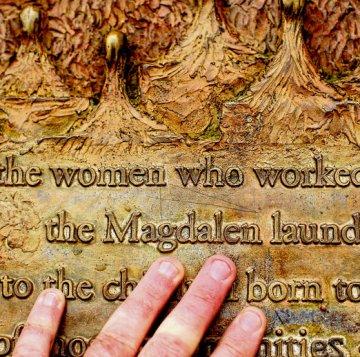Playing down the Magdalene Report for Fear of the Fallout
By Jacky Jones
SECOND OPINION: Forster Street in Galway runs alongside the gates of the old Magdalene home and laundry. Ordnance Survey maps included in the report of the inter-departmental committee to establish the facts of State involvement with the Magdalene laundries show that in 1898 there were just a few buildings opposite the laundry site. By 1944 the maps show a row of houses named St Mary Magdalen’s Terrace. The interesting thing about these houses is that they had no windows on the first storey, which overlooked the laundry grounds. Preserve anonymity Growing up in Galway, I was aware of the urban myths about the terrace, the most charitable being that no windows overlooked the laundry to preserve anonymity. A more cynical view was that “good” citizens had to be protected from looking into the grounds of the laundry in case they would absorb sexual immorality. Whatever the reason, Magdalen Terrace epitomised State involvement in the laundries, which extended even into planning law. The committee report provides a huge amount of information on admissions, routes of entry, age at time of entry, duration of stay, and so on, yet is silent about State involvement in the violation of the human rights of every girl and woman admitted to the laundries. This silence is very effective as it allows readers to fill the gaps making the report as powerful in what it says as in what it does not. Since its publication, Government spokespeople have attempted to minimise the involvement of the Irish State by quoting carefully selected statistics such as: the average age was 23; almost three-quarters were put in by people and groups other than the State; and 61 per cent stayed for less than a year. The Government is not being mealy-mouthed about the findings: it is scared of the fallout. “There is no single or simple story of the Magdalene laundries,” according to the report. I beg to differ. A system of slavery, servitude and enforced labour is the single, simple story. Age immaterial Age at time of entry is immaterial as girls and women of all ages have the same human rights. Routes of entry are irrelevant. Whether a girl or woman was put in by the Criminal Justice System, the Legion of Mary, the parish priest, family members, or “volunteered”, their human rights are equal. Virgins and prostitutes have the same human rights. Duration of stay, whether it was one week or more than 10 years, is irrelevant from a human rights perspective because none of the women should have been there in the first place. A Briefing Note on the McAleese Report prepared by Maeve O’Rourke for Justice for Magdalenes, shows that, far from applying today’s standards to criticise past events, “by the standards of the day the State’s involvement in, and oversight of, the Magdalene laundries system constituted the most grave and fundamental human rights violations”. She lists the State’s obligations to prevent and suppress slavery, servitude and enforced labour. Ireland ratified the League of Nations 1926 Slavery Convention in 1930 which obliged it to bring about the complete abolition of slavery in all its forms. The International Labour Organisation Forced Labour Convention was ratified in 1931 and Ireland undertook to “suppress the use of forced or compulsory labour”. Forced labour In spite of these undertakings, the numbers of women admitted to the Magdalene laundries increased from 1,846 in the 1920s to 2,498 in the 1940s. The European Convention on Human Rights ratified by Ireland in 1953 absolutely prohibits slavery and forced labour. Article 40.3.1 of the 1937 Irish Constitution guarantees to defend and vindicate the personal rights of all citizens. The human rights of these girls and women were ignored including: the right to liberty and freedom from arbitrary arrest and detention; the right to be free from cruel, inhuman or degrading, treatment or punishment; the right to respect for private and family life; and the right to freely participate in the cultural life of the community, to name just a few. Nuns were instructed by the State to keep the “inmates” ration books issued in 1942. The women were not even able to exercise their right to vote until 1963. The State had an obligation to protect and vindicate these rights and every government between 1922 and 1996 failed to do so. The report does not say whether this failure was because of neglect, incompetence or malevolence. Whatever the reason, it is time to just pay up.
|
.
Any original material on these pages is copyright © BishopAccountability.org 2004. Reproduce freely with attribution.
